A majority of Americans say abortion should be legal in all or most cases, but many are open to restrictions; many opponents of legal abortion say it should be legal in some circumstances
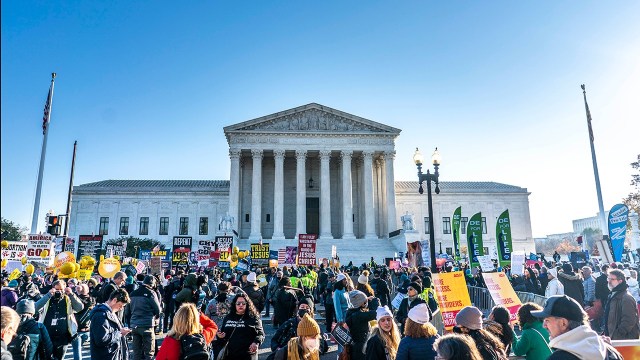
Pew Research Center conducted this study to examine the public’s attitudes about abortion in the United States. For this analysis, we surveyed 10,441 U.S. adults from March 7-13, 2022. Everyone who took part in the survey is a member of the Center’s American Trends Panel (ATP), an online survey panel that is recruited through national, random sampling of residential addresses, which gives nearly all U.S. adults a chance of selection. The survey is weighted to be representative of the U.S. adult population by gender, race, ethnicity, partisan affiliation, education and other categories. Read more about the ATP’s methodology.
Here are the questions used for this analysis, along with responses, and its methodology.
The Center undertook this survey because the U.S. Supreme Court is expected to announce a decision about abortion in Dobbs v. Jackson Women’s Health Organization before the end of its current term. Following the initial arguments, many observers anticipated that the high court could partially or completely overturn Roe v. Wade and Planned Parenthood v. Casey, two landmark decisions that prevented states from significantly restricting abortion before a fetus is considered viable outside the womb. And after this survey was completed, a leaked draft of the majority opinion in Dobbs published by Politico this week suggested that the court’s upcoming decision would indeed completely overturn Roe and Casey. In anticipation of the court’s decision, several states already have made moves in the direction of stricter abortion regulations, while others have moved to protect abortion access. The new survey did not ask specifically about Roe, but previous Center studies have found that most Americans say the court should not completely overturn that decision.
Given the nuances of many people’s opinions on the topic, measuring views on abortion is not easy. There are a vast number of ways to frame questions about the legality (or morality) of abortion when combining multiple possible factors, such as the stage of the pregnancy, the circumstances of the pregnant person, the health of the fetus, and many other possible complications or scenarios.
Nonetheless, the new survey seeks to explore some dimensions of the debate, beginning with the public’s views on whether abortion should broadly be legal or illegal, and then moving on to probe views on specific circumstances. Because the survey could not take every possible scenario into account, several questions offered respondents the option to say “it depends” rather than taking a more firm or clear position on whether abortion should be legal or illegal in particular situations. Respondents also were asked about whether women or their doctors should be punished for abortions performed illegally, how important the issue is to voters in the 2022 midterms, and how much influence religion has on their views of abortion.
The abortion debate in America is often framed as a legal binary, with “pro-life” people on one side, seeking to restrict abortion’s availability, and “pro-choice” people on the other, opposing government restrictions on abortion.
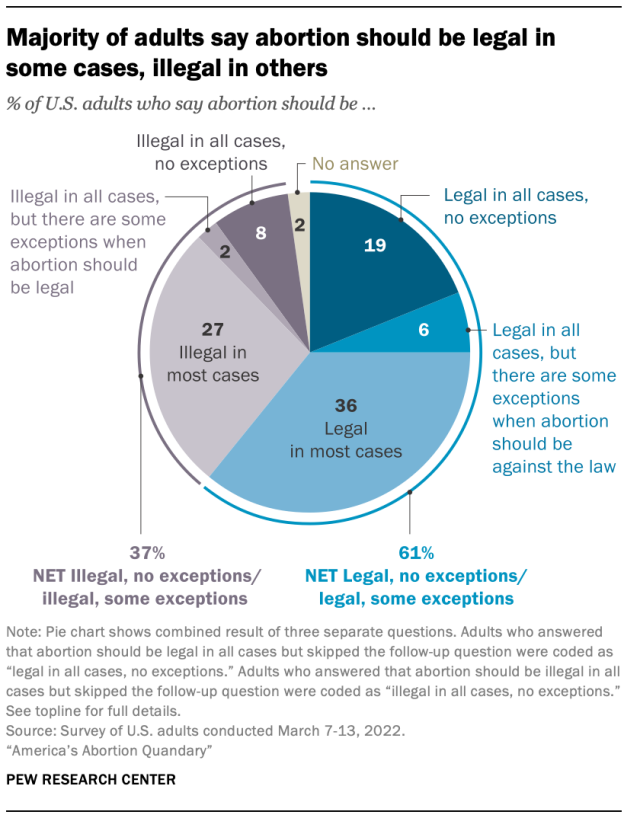
But as the country approaches what could be a watershed moment in the history of abortion laws and policies, relatively few Americans on either side of the debate take an absolutist view on the legality of abortion – either supporting or opposing it at all times, regardless of circumstances.
A new Pew Research Center survey explores in detail the nuances of the public’s attitudes on this issue. The survey was conducted March 7-13, 2022 – after the Supreme Court’s oral arguments on a case this term challenging the 1973 Roe v. Wade decision that established a federal right to abortion, but before the May 2 publication of a leaked draft of a Supreme Court majority opinion that suggests the court is poised to strike down Roe.
Nearly one-in-five U.S. adults (19%) say that abortion should be legal in all cases, with no exceptions. Fewer (8%) say abortion should be illegal in every case, without exception. By contrast, 71% either say it should be mostly legal or mostly illegal, or say there are exceptions to their blanket support for, or opposition to, legal abortion.
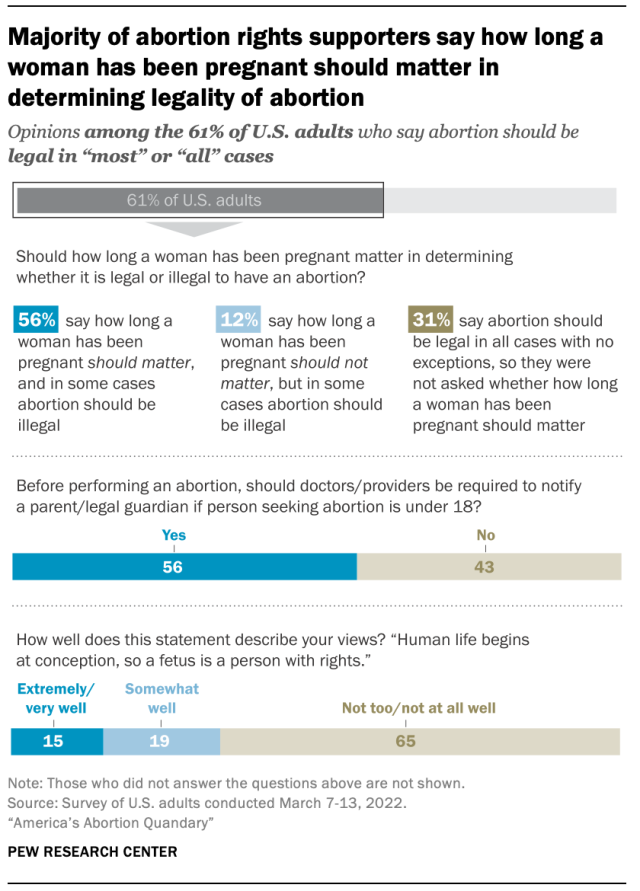
As in the past, more Americans say abortion should be legal in all or most circumstances (61%) than illegal in all or most circumstances (37%). But in many ways, the public’s attitudes are contingent upon such circumstances as when an abortion takes place during a woman’s pregnancy, whether the pregnancy endangers a woman’s life and whether a baby would have severe health problems.
There is evidence that many people are cross-pressured on this issue. For example, more than half of Americans who generally support abortion rights – by saying it should be legal in “most” or “all” cases – also say the timing of an abortion (i.e., how far along the pregnancy is) should be a factor in determining its legality (56%).
The same share of people who generally support legal abortion say abortion providers should be required to get the consent of a parent or guardian before performing an abortion on a minor (56%).
And about a third of Americans who generally support legal abortion (33%) say the statement “human life begins at conception, so a fetus is a person with rights” describes their own view at least “somewhat” well.
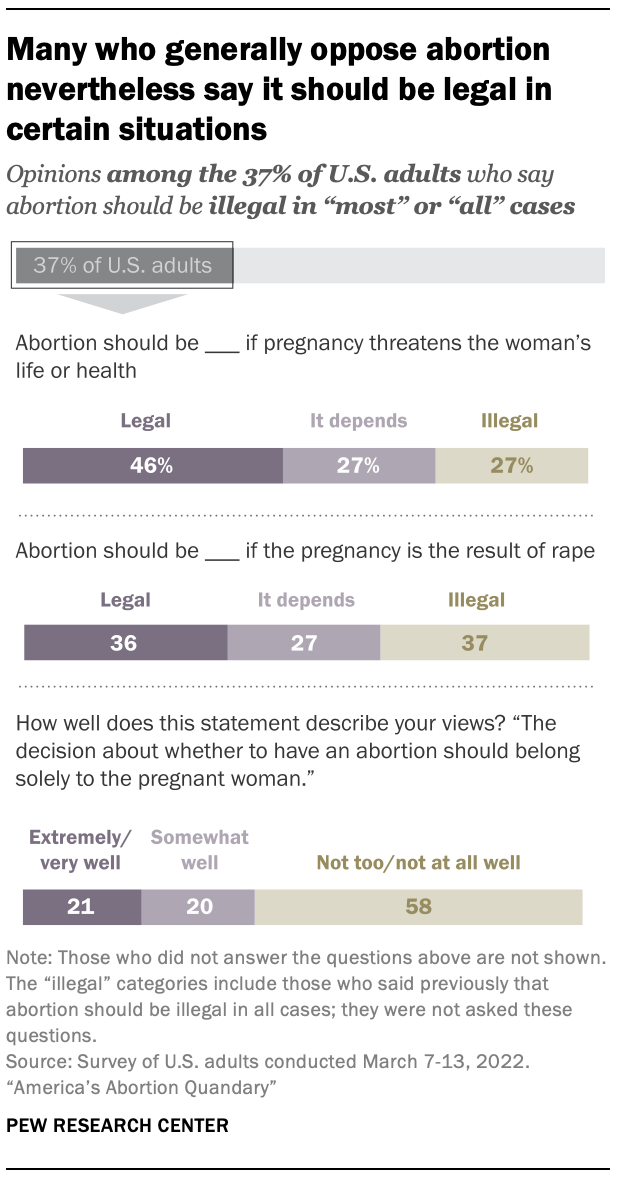
At the same time, large shares of those who generally oppose abortion say it should be legal in certain situations or say their position depends on the circumstances. For example, among those who say abortion should be against the law in most or all cases, nearly half (46%) say it should be legal if the pregnancy threatens the health or life of the woman. An additional 27% say “it depends” in this situation, while 27% say abortion should be illegal even in circumstances that threaten the health or life of the pregnant woman.
More than a third of abortion opponents (36%) say it should be legal if the pregnancy results from rape, with 27% saying “it depends” and 37% expressing opposition to legal abortion even in this situation. And four-in-ten abortion opponents (41%) say the statement “the decision about whether to have an abortion should belong solely to the pregnant woman” describes their own view at least “somewhat” well.
Among Americans overall, most people (72%) say that “the decision about whether to have an abortion should belong solely to the pregnant woman” describes their views at least somewhat well, and more than half (56%) say the same about the statement “human life begins at conception, so a fetus is a person with rights.”
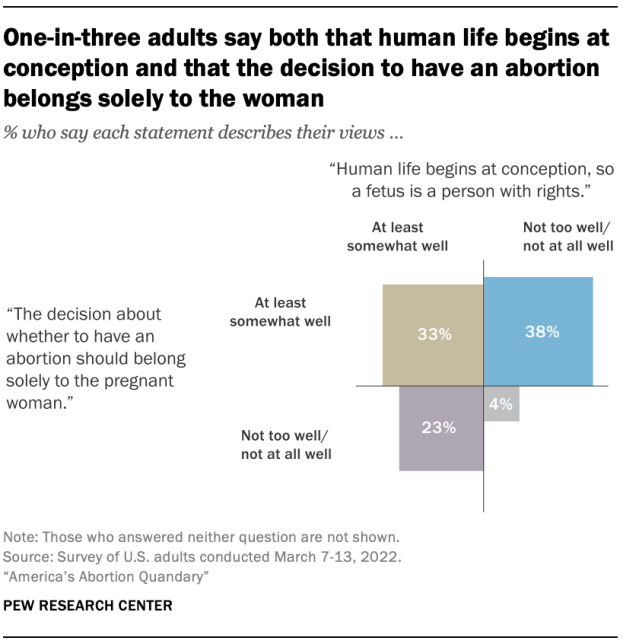
A third of Americans hold these seemingly conflicting views about the autonomy of pregnant women and the rights of the fetus at the same time, saying that both statements describe their views either extremely well, very well, or somewhat well.
Moreover, the survey finds a distinction between how Americans feel about abortion in moral terms and in legal terms. While many (47%) see abortion as morally wrong in most or all cases, fewer (22%) say that abortion should be illegal in every situation where they believe it is immoral. Nearly half of U.S. adults (48%) say there are circumstances in which abortion is morally wrong but should nevertheless be legal.
And while nearly six-in-ten adults (57%) say they think stricter abortion laws would reduce the number of abortions performed in the United States, similar or larger shares say that increasing support for pregnant women (65%), expanding sex education (60%) and increasing support for parents (58%) would have the same effect.
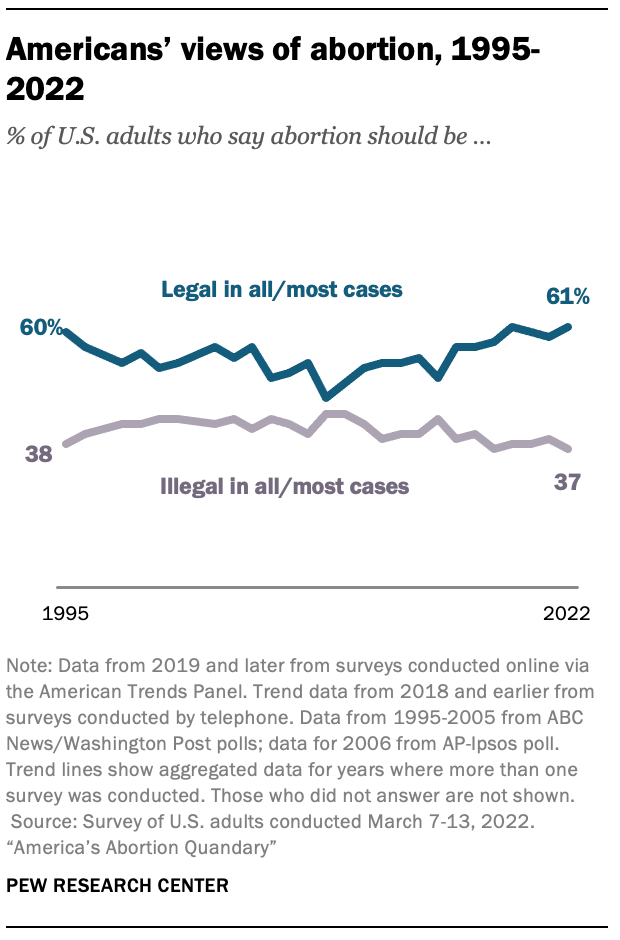
These are among the key findings of a new Pew Research Center survey, conducted among 10,441 adults on the Center’s American Trends Panel. The Center has asked the public about their opinions on abortion for decades, but many of the questions in this survey are new, aimed at providing a more nuanced picture of public opinion.
On the Center’s long-running question about the legality of abortion – which asks whether it should generally be illegal in all cases, illegal in most cases, legal in most cases, or legal in all cases – public views have remained relatively stable in recent years. But support for legal abortion is as high today as at any point in surveys asking this question since 1995.
Most Americans typically do not give a lot of thought to issues around abortion: 36% say, prior to taking the survey in March, they had given a lot of thought to abortion-related issues.
Broad public agreement that abortion should be legal if pregnancy endangers a woman’s health or is the result of rape
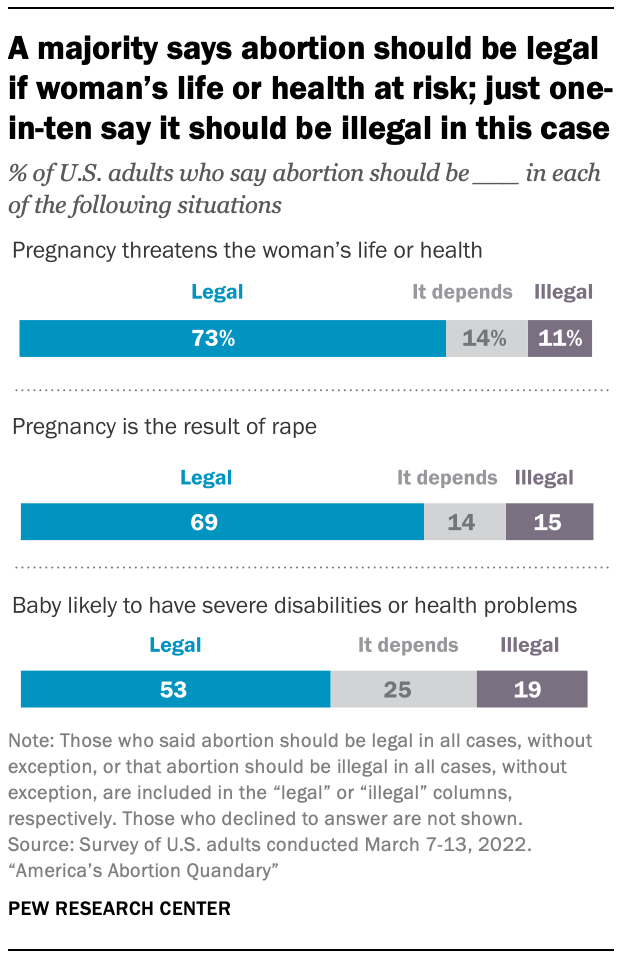
While most Americans do not have absolutist views about abortion – desiring neither to see it completely outlawed nor permitted without exception – there are certain situations in which there is clear consensus abortion should be legal.
Nearly three-quarters of adults (73%) say abortion should be legal if the woman’s life or health is endangered by the pregnancy, while just 11% say it should be illegal. And about seven-in-ten say abortion should be legal if the pregnancy is a result of rape, with just 15% saying it should be illegal in this case.
A smaller majority of U.S. adults (53%) say abortion should be legal if the baby is likely to be born with severe disabilities or health problems – though in this situation, too, a far larger share say abortion should be legal than say it should be against the law (19% say it should be illegal in such cases, while a quarter say “it depends”).
Most Americans open to some restrictions on abortion
At the same time, the survey shows that large numbers of Americans favor certain restrictions on access to abortions. For example, seven-in-ten say doctors should be required to notify a parent or legal guardian of minors seeking abortions. And most of those who say abortion should be legal in some cases and illegal in others say that how long a woman has been pregnant should be a factor in determining whether abortion is legal or illegal (56% among all U.S. adults).
Combined with the 8% of U.S. adults who say abortion should be against the law in all cases with no exceptions, this means that nearly two-thirds of the public thinks abortion either should be entirely illegal at every stage of a pregnancy or should become illegal, at least in some cases, at some point during the course of a pregnancy.

On the other side, combining the 56% of U.S. adults who say how long a woman has been pregnant should matter in determining the legality of abortion with the 19% who say abortion should be legal in all cases also means that about three-quarters of the public thinks abortion either should be entirely legal at every stage of a pregnancy or should be legal, at least in some cases, at some point in a pregnancy.
When, exactly, during a pregnancy should abortion be legal, and at what point should it become illegal? To help answer this question, the survey posed follow-up queries about three periods: six weeks (when cardiac activity – sometimes called a fetal heartbeat – can be detected), 14 weeks (roughly the end of the first trimester), and 24 weeks (near the end of the second trimester).
The survey data shows that as pregnancy progresses, opposition to legal abortion grows and support for legal abortion declines. Americans are about twice as likely to say abortion should be legal at six weeks than to say it should be illegal at this stage of a pregnancy: 44% of U.S. adults say abortion should be legal at six weeks (including those who say it should be legal in all cases without exception), 21% say it should be illegal at six weeks (including those who say abortion should always be illegal), and another 19% say whether it should be legal or not at six weeks “depends.” (An additional 14% say the stage of pregnancy shouldn’t factor into determining whether abortion is legal or illegal, including 7% who generally think abortion should be legal, and 6% who generally think it should be illegal.)
At 14 weeks, the share saying abortion should be legal declines to 34%, while 27% say illegal and 22% say “it depends.”
When asked about the legality of abortion at 24 weeks of pregnancy (described as a point when a healthy fetus could survive outside the woman’s body, with medical attention), Americans are about twice as likely to say abortion should be illegal as to say it should be legal at this time point (43% vs. 22%), with 18% saying “it depends.”
However, in a follow-up question, 44% of those who initially say abortion should be illegal at this late stage go on to say that, in cases where the woman’s life is threatened or the baby will be born with severe disabilities, abortion should be legal at 24 weeks. An additional 48% answer the follow-up question by saying “it depends,” and 7% reiterate that abortion should be illegal at this stage of pregnancy even if the woman’s life is in danger or the baby faces severe disabilities.
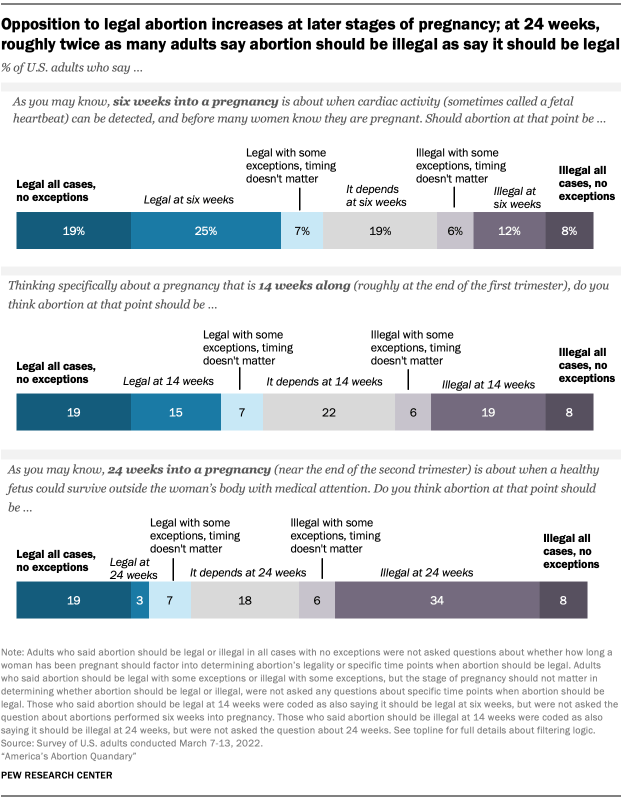
Views of penalties for abortion in situations where it is illegal
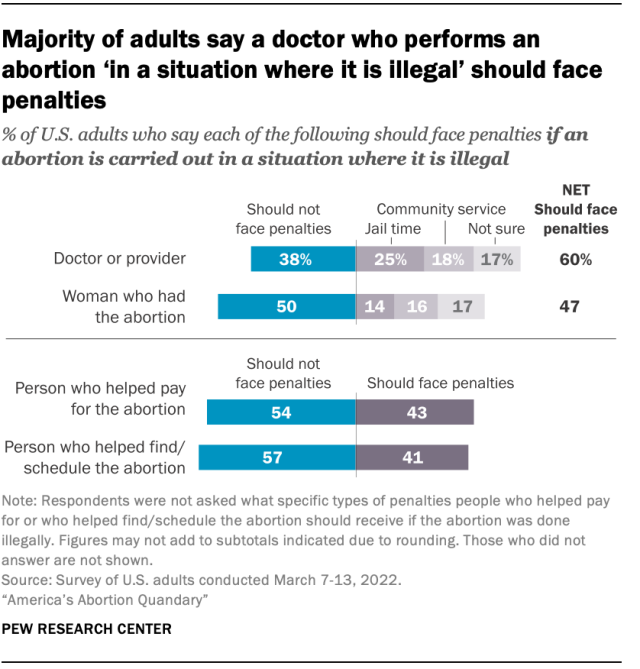
If most people think there are at least some situations in which abortion should be against the law, an obvious follow-up question is: Who should face legal penalties if an abortion is performed illegally? And what should those penalties entail?
The survey asked whether four types of people should face penalties if an abortion takes place in a situation where it is illegal: doctors or medical providers who perform abortions, women who have abortions, people who help pay for abortions and people who help find or schedule abortions.
Six-in-ten U.S. adults say that if doctors and other providers perform abortions in situations where it is illegal, then they should face penalties – including 25% who say the doctors/providers should serve jail time for performing abortions illegally, 18% who say they should face fines or community service, and 17% who aren’t sure what type of penalty would be appropriate. In response to a separate question, 31% of Americans say doctors should lose their medical licenses for performing an abortion illegally.
Compared with views on penalizing doctors, there is less support for punishing women who obtain an abortion illegally or for punishing people who help find, schedule and pay for the procedures. Nearly half of U.S. adults (47%) say women who obtain an abortion illegally should be penalized for doing so, while half say such women should not face penalties. Roughly four-in-ten favor legal punishments for people who help pay for an abortion that is performed illegally (43%) or who help find and schedule it (41%).
Support for punishing those who perform or obtain abortions illegally is tied to views about whether abortion should be legal or illegal in the first place. Still, 55% of those who say abortion should be legal, with some exceptions, say doctors who perform abortions in situations where it is illegal should face penalties, as do overwhelming shares of those who say abortion should always or mostly be illegal. See Chapter 1 for details.
Partisan differences in views of abortion
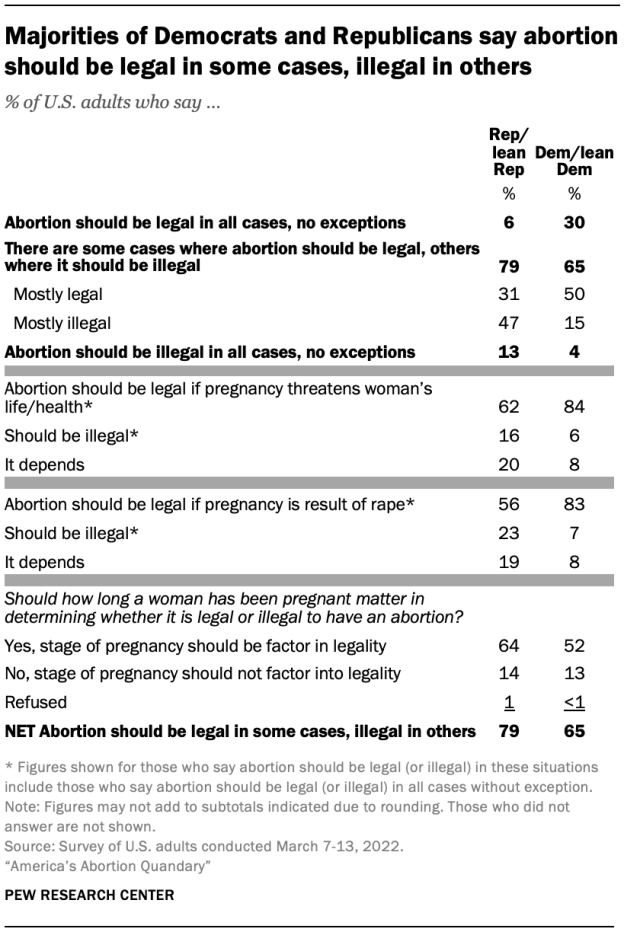
There are wide differences between the views of Democrats and Republicans on abortion. Democrats are far more likely than Republicans to say abortion should be legal in most or all cases, while Republicans are more likely than Democrats to say it should be illegal in most or all cases.
And in every specific scenario asked about in the survey – including situations where pregnancy threatens the life or health of the woman, or where pregnancy is the result of rape – Democrats are more likely than Republicans to say abortion should be legal.
Still, most Democrats say there are at least some instances in which abortion should be illegal, and most Republicans say there are at least some instances in which abortion should be legal, including when the life or health of the pregnant woman is at risk and when the pregnancy is the result of rape.
About half of Democrats and roughly two-thirds of Republicans say the stage of pregnancy should be a factor in determining abortion’s legality. Four-in-ten Democrats and independents who lean toward the Democratic Party (40%) say the statement “human life begins at conception, so a fetus is a person with rights” describes their own view at least somewhat well, and more than half of Republicans and GOP leaners (55%) say the same about the statement “the decision about whether to have an abortion should belong solely to the pregnant woman.”
Women are more likely than men to have thought ‘a lot’ about abortion, but there are only modest gender differences in views of legality
More than half of U.S. adults – including 60% of women and 51% of men – say that women should have a greater say than men in setting abortion policy. Just 3% of U.S. adults say men should have more influence over abortion policy than women, with the remainder (39%) saying women and men should have equal say when it comes to making abortion policy.
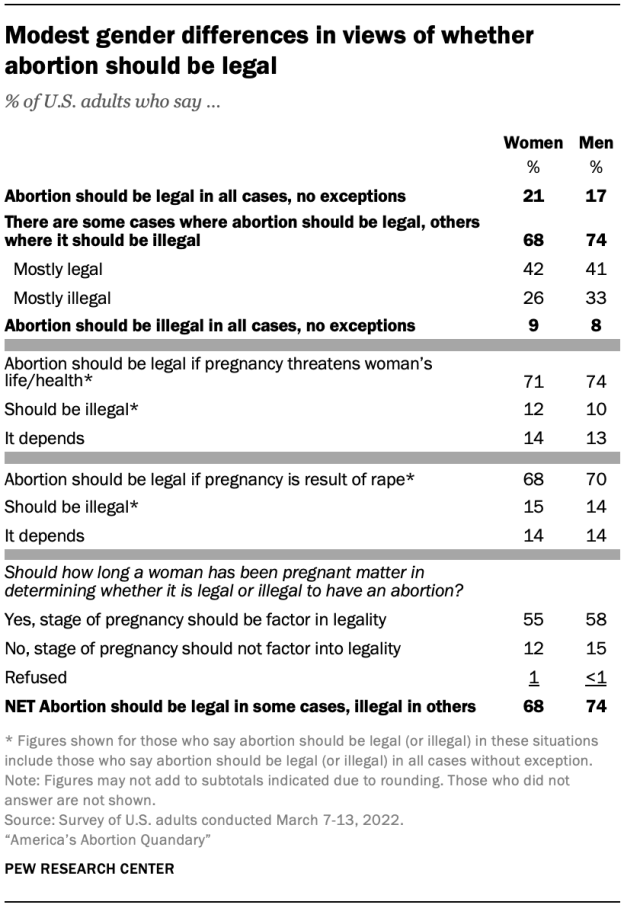
The survey also finds that by some metrics, women report being closer to the issue than men. For example, women are more likely than men to say they have thought “a lot” about abortion (40% vs. 30%). They are also considerably more likely to say they personally know someone who has had an abortion (66% vs. 51%) – a gap that is evident across age groups, political parties and religious groups.
But there are only modest gender differences on the survey’s questions about abortion’s legality; women and men mostly agree with each other that abortion should be legal in cases of danger to the life or health of the pregnant woman and in the case of rape. More than half of both women and men agree that how long a woman has been pregnant should be a factor in determining whether abortion is legal in any given case. And while women are slightly more likely than men to say abortion should be legal in all cases with no exceptions (21% vs. 17%), large majorities of both women (68%) and men (74%) say there are some cases where abortion should be legal and others where it should be illegal.
White evangelicals are most opposed to abortion – but majorities across Christian subgroups see gray areas
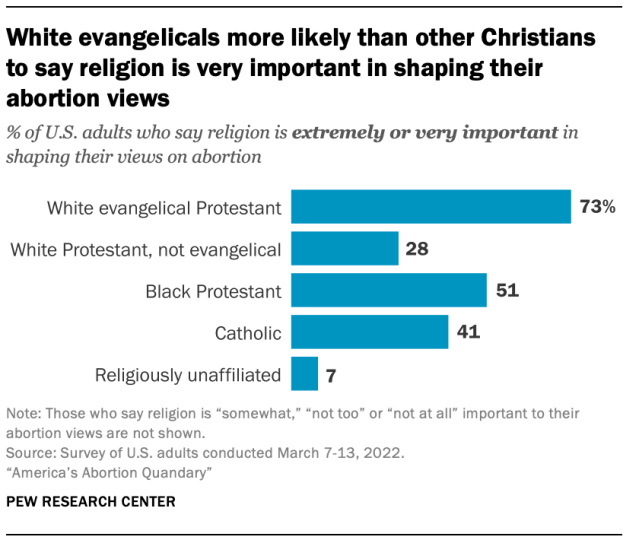
Among religious groups analyzed in the survey, White evangelical Protestants are most opposed to abortion. Nearly three-quarters say that abortion should be against the law in all cases without exception (21%) or that it should be illegal in most cases (53%). White evangelicals are also far more likely than U.S. adults who identify with other religious groups to say that life begins at conception and that the fetus is thus a person with rights; 86% of White evangelicals express this view. White evangelicals are also more likely than those in other Christian groups to say their opinions on abortion are influenced by their religious beliefs.
At the other end of the spectrum, religious “nones” – U.S. adults who describe themselves, religiously, as atheists, agnostics or “nothing in particular” – are most supportive of legal abortion. Among religious “nones,” upwards of eight-in-ten say abortion should be legal in all cases with no exceptions (34%) or that it should be legal in most cases (51%). Self-described atheists are more absolutist in their opinions about abortion than any other religious group analyzed in the survey, with 53% saying abortion should be legal in all cases, no exceptions.
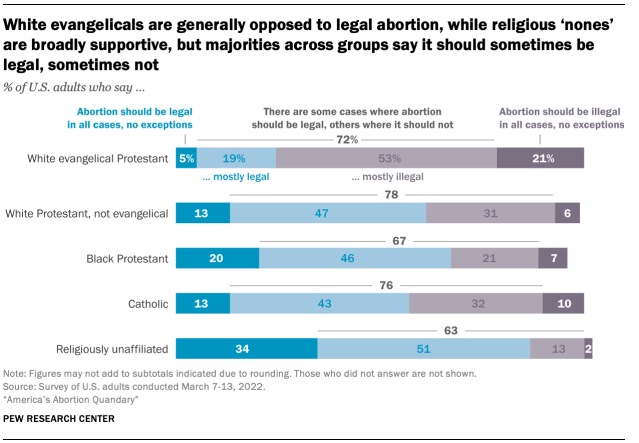
White Protestants who are not evangelical, Black Protestants, and Catholics tend to be less opposed to legal abortion than White evangelicals, but they are also less supportive of it than religious “nones.”
One commonality across these groups is that sizable numbers in all of them see the issue of abortion in shades of gray. Large majorities in every group – ranging from 63% of religious “nones” to 78% of White non-evangelical Protestants – say abortion should be legal in some circumstances and illegal in others. Half of White evangelicals (51%) say abortion should be legal if the pregnancy threatens the life or health of the woman. Half of religious “nones” (50%) say the stage of pregnancy should factor into decisions about whether abortion should be legal.
Although the survey was conducted among Americans of all religious backgrounds, including Jews, Muslims, Buddhists and Hindus, it did not obtain enough respondents who are religiously affiliated with non-Christian groups to report separately on their responses. Small subgroups of Christians are unable to be analyzed separately for the same reason.
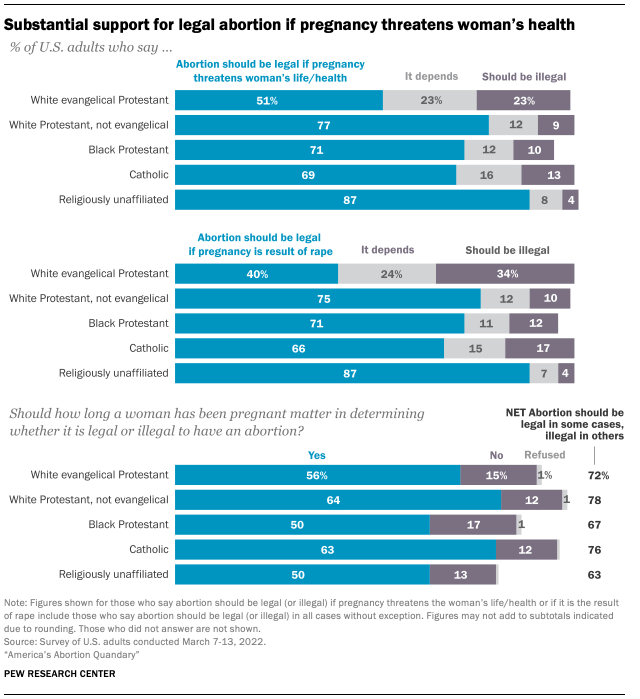
Guide to this report
The remainder of this report discusses these findings in additional detail. Chapter 1 focuses on legal questions surrounding abortion. Chapter 2 examines the broader moral and religious questions surrounding the topic. Chapter 3 discusses the public’s experiences and engagement with abortion.




